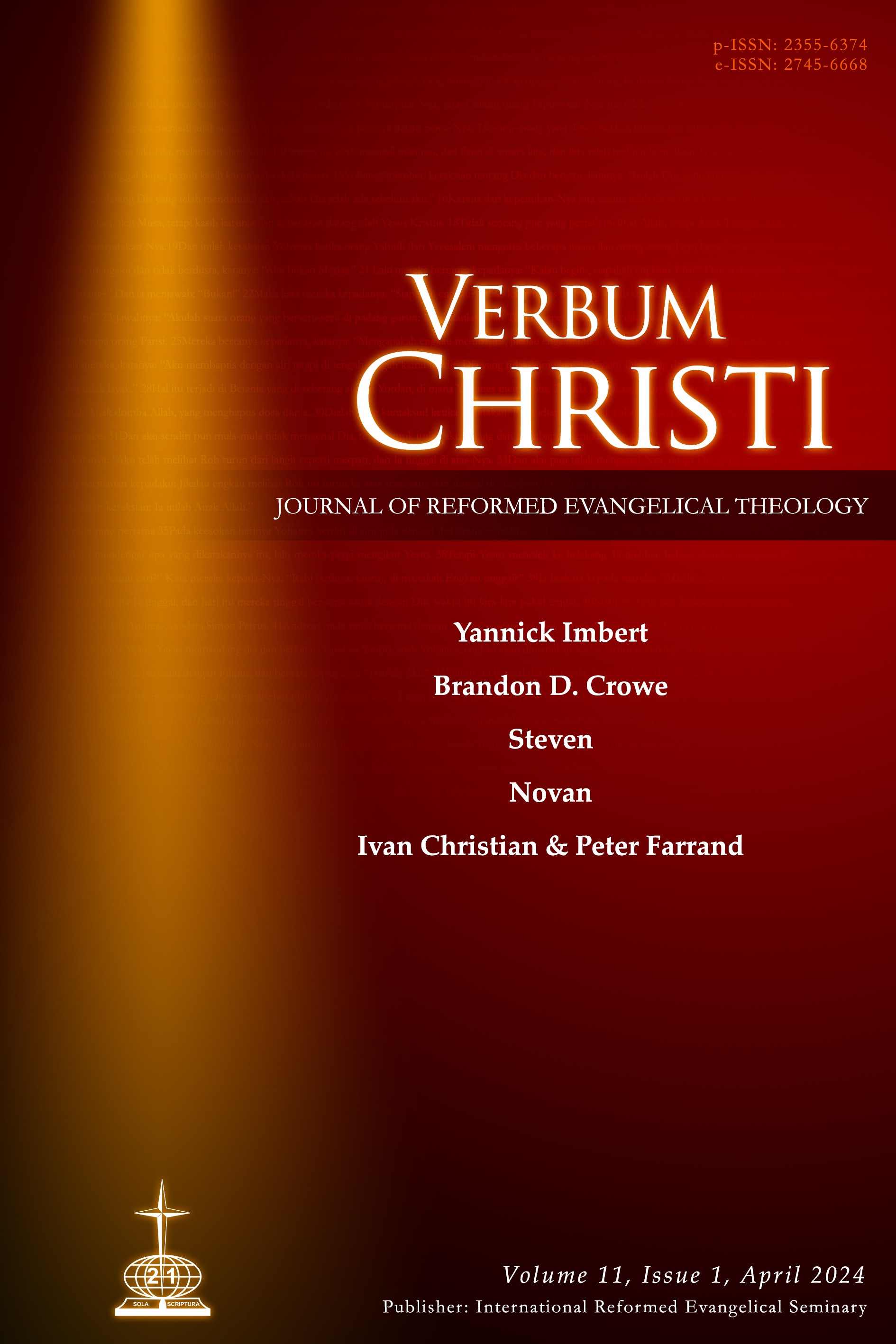Dari Spiritual hingga Imajinasi yang Diperbarui
Pencarian C. S. Lewis akan Sukacita, Imajinasi, dan Tuhan
DOI:
https://doi.org/10.51688/VC11.1.2024.art1Kata Kunci:
C.S. Lewis, imajinasi, sukacita, idealisme, teismeAbstrak
Pertobatan C. S. Lewis ke teisme Kristen menyatukan pencariannya akan sukacita dan pandangannya yang terus berkembang tentang kekuatan imajinasi. Penerimaan Lewis terhadap agama Kristen menimbulkan pertanyaan tentang sifat hubungan antara dua elemen fundamental evolusi filosofisnya: sukacita dan imajinasi. Dalam artikel ini, penulis bertujuan untuk memperjelas aspek kehidupan intelektual dan spiritual Lewis dengan mempertimbangkan perkembangan filosofisnya. Hubungan penting antara sukacita dan imajinasi menjadi jelas hanya jika kita mempertimbangkan perjalanan intelektual Lewis dari ateisme ke idealisme dan kemudian ke teisme Kristen. Dalam artikel ini, saya mempertimbangkan perkembangan intelektual Lewis sejak ia mengadopsi idealisme subjektif versinya sendiri.
Unduhan
Referensi
Alexander, Samuel. Space, Time and Deity: The Gifford Lectures at Glasgow 1916–1918. 2 vols. London: Macmillan, 1920.
Barfield, Owen. “Autem.” In The “Great War” of Owen Barfield and C. S. Lewis. Philosophical Writings 1927–1930. Edited by Norbert Feinendegen and Arend Smilde, Inklings Studies Supplement, vol. 1 (2015): 113–120.
–––. Poetic Diction. Middletown: Wesleyan Press, 1973. Feinendegen, Norbert. “Introduction,” in The “Great War” of Owen Barfield and C. S. Lewis. Philosophical Writings 1927–1930. Edited by Norbert Feinendegen and Arend Smilde, Inklings Studies Supplement, vol. 1 (2015): 3–31.
–––. “The Philosopher’s Progress: C.S. Lewis’ Intellectual Journey from Atheism to Theism.” Journal of Inklings Studies 8, no. 2 (2018): 103–143.
Gould, Paul M. Cultural Apologetics. Renewing the Christian Voice, Conscience, and Imagination in a Disenchanted World. Grand Rapids, Zondervan, 2019.
Heck, Joel D. From Atheism to Theism. The Story of C. S. Lewis. St. Louis: Concordia, 2017.
Johnston, William H. “The Conversions of C.S. Lewis: Notes on Rethinking Their Chronology and Character.” Journal of Inklings Studies 13, no. 1 (2023): 1–27.
Lazo, Andrew. “Correcting the Chronology: Some Implications of ‘Early Prose Joy’.” VII: An Anglo-American Literary Review 29 (2012): 51–62.
–––. “‘Early Prose Joy’’: C.S. Lewis’s Early Draft of an Autobiographical Manuscript.” VII: An Anglo-American Literary Review 30 (2013): 13–49.
–––. “Sehnsucht as Signpost: The Autobiographical Impulse of C. S. Lewis.” Perichoresis 20, no. 3 (2022): 33–53.
Lewis, C. S. “Bluspels and Flalansferes.” In Selected Literary Essays, edited by Walter Hooper, 251–265. Cambridge: Cambridge University Press, 2013.
–––. “Christianity and Culture.” In Christian Reflections, edited by Walter Hooper, 12–36. Grand Rapids: Eerdmans, 1967.
–––. “Clivi Hamiltonis Summae Metaphysices Contra Anthroposophos Libri II.” In The “Great War” of Owen Barfield and C. S. Lewis. Philosophical Writings 1927–1930. Edited by Norbert Feinendegen and Arend Smilde, Inklings Studies Supplement, vol. 1 (2015): 58–102.
–––. Miracles. A Preliminary Study. New York: HarperCollins, 2001.
–––. “Myth Became Fact.” In God in the Dock, edited by Walter Hooper, 63–67. Grand Rapids: Eerdmans, 1970.
–––. Prayer: Letters to Malcolm. London: Fontana, 1981.
–––. “Rejoinder to Dr. Pittenger.” In God in the Dock, edited by Walter Hooper, 177–183. Grand Rapids: Eerdmans, 1970.
–––. The Collected Letters of C. S. Lewis. Vol. 1, Family Letters 1905–1931. Edited by Walter
Hooper.. New York: HarperCollins, 2004.
–––. The Collected Letters of C. S. Lewis. Vol. 2, Books, Broadcasts, and the War, 1931–1949. Edited by Walter Hooper. New York: Harper Collins, 2004.
–––. The Collected Letters of C. S. Lewis. Vol. 3, Narnia, Cambridge, and Joy 1950–1963. Edited by Walter Hooper. New York: Harper Collins, 2007.
–––. The Pilgrim's Regress. New York, London: Bantam Books, 1986.
–––. The Shape of My Early Life. London: William Collins, 2012.
McGrath, Alister. C. S. Lewis. A Life: Eccentric Genius, Reluctant Prophet. London: Hodder & Stoughton, 2013.
–––. The Intellectual World of C. S. Lewis. Chichester: Wiley-Blackwell, 2014.
Ordway, Holly. Apologetics and the Christian Imagination: An Integrated Approach to Defending the Faith. Steubenville: Emmaus Road Publishing, 2017.
Penner, Myron Bradley. The End of Apologetics. Christian Witness in a Postmodern Context. Grand Rapids: Michigan, 2013.
Schakel, Peter. Imagination and the Arts in C.S. Lewis: Journeying to Narnia and other Worlds. Columbia: University of Missouri Press, 2002.
–––. Reason and Imagination in C. S. Lewis: A Study of Till We Have Faces. Grand Rapids: Eerdmans, 1984.
Spufford, Francis. Unapologetic. Why, Despite Everything, Christianity Can Still Make Surprising Emotional Sense. New York: HarperCollins, 2012.
Starr, Charlie. “Meaning, Meanings, and Epistemology in C. S. Lewis.” Mythlore 25, no. 3/4 (2007): 161–182.
Thorson, Stephen. Joy and Poetic Imagination. Understanding C.S. Lewis’s ‘Great War’ with Owen Barfield and its Significance for Lewis’s Conversion and Writings. Hamden: Winged Lion Press, 2015.
Tennyson, G. B., ed. Owen Barfield on C.S. Lewis. Middletown: Wesleyan University Press, 1989.
–––. “Lewis and Barfield on Imaginatio.” Mythlore 17, no. 2 (1990): 12–32.
Tolkien, J. R. R. “Mythopoeia.” In Tree and Leaf, edited by Christopher Tolkien, 83–90. London: HarperCollins, 2001.
–––. On Fairy-stories. Edited by Verlyn Flieger and Douglas A. Anderson. London: HarperCollins, 2008.
Unduhan
Diterbitkan
Cara Mengutip
Terbitan
Bagian
Lisensi
Hak Cipta (c) 2024 Verbum Christi: Jurnal Teologi Reformed Injili

Artikel ini berlisensi Creative Commons Attribution-NonCommercial 4.0 International License.




